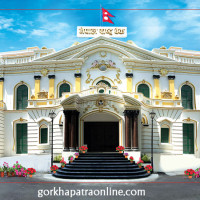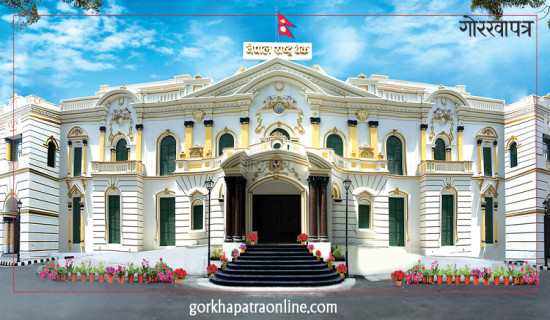- Monday, 25 August 2025
Changed Tune On Immigrants
Obtaining citizenship in the United States will be an additional onerous proposition. Two months ago, President Donald Trump declared that no one would automatically be eligible for American citizenship merely by being born in the country. Immigrants have become a source of not just irritation but anger in the United Kingdom and many other European countries, too. Unemployment and inflation irk them. They fear their cultural identity being overwhelmed because of immigrants. This is openly expressed and debated.
In several European states, “right-wing” parties have gained marked rise in popular votes and parliamentary representation. Contrary to political leaders’ earlier lofty talk about human values and sharing opportunities with others in a globalisation spirit, the views now are against “uncontrolled” immigration. For many potential immigrants, that route would be the ideal one—hassle-free, secure and safe. In harsh reality, it is economics and not human values that clinch a potential host country’s calculated decision. Immigrants with skills have contributed a mighty lot to the growth and prosperity of host countries. But their other family members face an increased degree of uncertainty now.
Tony Blair, who led his Labour Party to three consecutive electoral victories in the UK earlier to be in the prime minister’s chair from 1997 to 2007, struggles to defend his policy of mass migration. He rejects criticism that his government threw open the immigration doors wide open to the world as “total nonsense”. Islamophobia is another campaign that has hit many European cities. Issues of mass immigration and multiculturalism have affected the United Kingdom, too. Anti-immigrant slogans include “An open door to crime and terror”. A few black sheep and criminals are lumped together with entire foreign communities. Crime rate in the US shows that non-migrants the largest number of culprits.
Identity issues
Assertion of identity is an expression of freedom. Powerful neighbours and regional hegemons invoke the rights of minorities and religious groups to foment issues with weaker states and fuel local uprisings. History is filled with fierce fighting for “freedom”. In an age of artificial intelligence, one would anticipate inter-country and inter-regional professional identity and diversity getting widely promoted by the next decade. When Indian-origin Anita Anand took oath as foreign minister of the Mark Carney cabinet in Canada in May, with her hands on Bhagavad Gita, a revered Hindu scripture, comments in social media and news reportage in India gushed with pride. The event was not given enthusiastic media coverage elsewhere. A former corporate lawyer, Anand’s first ministerial stint was in 2019, when she looked after public services and procurement.
Three years ago, British Prime Minister Rishi Sunak’s family celebrated the Hindu festival of Diwali with oil-fed lamps lit at London’s No. 10 Downing Street, which caught considerable media attention. If a nation’s economy went downhill and underemployment queues lengthened for long, immigrants would be vulnerable to various forms of attack in response to crimes committed by individuals of foreign descent. One step wrong, and the wrath of some sections can go berserk. Blame is put on all immigrants, suddenly disparaged as uncommonly ungrateful. The threat to national “culture and identity” is also brought up.
In economically less difficult times, immigrants are received as sources of youth and productivity, with the host states not having to invest anything in the foreign arrivals by way of bringing them up and educating them. Today, discordant notes echo in the very countries that lauded and loudly championed the call for respecting cultural diversity and promoting due representation of identity in all aspects of the national mainstream.
The US, for instance, is a country built to a large extent on the strength of immigrants. Although politicians in the US generally do not openly complain about immigrants not integrating into the country’s traditional mainstream, political leaders in Europe express concern over the lack of social and cultural assimilation among them. How does a government mix or match merit and identity? It might be attractive to many at first sound and sight of the word “representation”, but it also engages considerable energy that exacts a challenging balancing act between quality participation and technical representation.
Changing patterns
Patterns are changing. Whereas unity in diversity used to be the hallmark of many democracies that are given “advanced” ratings by agencies they recognise, the emphasis on “melting pot” culture is now being gradually discarded if the legacy communities feel competition for jobs, voice, and agendas. The US Vice-President JD Vance, in a television interview, said Europe risks civilisational suicide, and warned that the continent’s main religion and culture were at serious stake because of immigrants.
The Trump administration has come down heavily against the practice of overriding merit in the selection process, which provoked resentment and created political division. In a renewed interpretation of non-discrimination, the Education Department in the US has directed schools not to use race as a criterion for employing staff and awarding scholarships. Some Western ideas of religious conversion, backed by humanitarian activity and aid politics, contradict the lofty democratic ideals of diversity and democracy. Much of the West today laments immigrants’ resistance to assimilation but does not hesitate to stoke divisions in other countries for deep identity politics and cultural encroachment.
Reports of detention and deportation of immigrants are hailed as the right move by the governments in Europe. This is especially so when the economy is sluggish and a number of prominent public posts are held by individuals of foreign descent. It fails to realise that the world outlook has undergone a sea change. It took time to surface and become loud enough to be heard before sounding the bugle of assertiveness.
(Professor Kharel specialises in political communication.)















